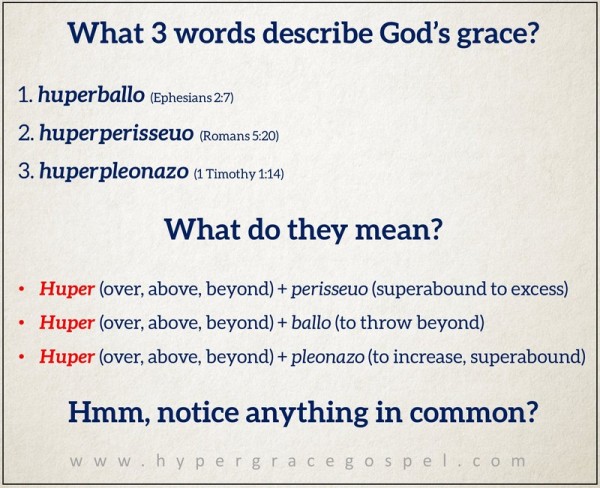Hypergrace, according to a mainstream Christian news magazine, is a dangerous and unbiblical teaching. By proclaiming the unconditional love of God and forgiveness for all, hypergrace preachers have taken grace too far. We have made grace unbalanced and radical.
Hypergrace, apparently, is unbiblical. It’s a modern invention based on a few scriptures taken out of context, and it does not reflect the whole counsel of God.
This claim – that hyper or extreme grace is unbiblical – is easy to test. All you need is a Bible.
Six pictures of God’s grace
In him we have redemption through his blood, the forgiveness of sins, in accordance with the riches of God’s grace. (Ephesians 1:7)
God is rich in grace, but how rich is he? The word for riches in this verse (ploutos) is the same word used to describe God’s wisdom and knowledge (Rom 11:33). God is as rich in grace as he is in wisdom. How wise is God? He is exceedingly wise! He is hyper-wise. As for one, so for the other. Limit God’s grace and you limit his wisdom.
And God raised us up with Christ and seated us with him in the heavenly realms in Christ Jesus, in order that in the coming ages he might show the incomparable riches of his grace, expressed in his kindness to us in Christ Jesus. (Ephesians 2:6-7)
Other translations refer to the “full wealth,” “extraordinary greatness,” and “immeasurable (limitless) riches” of God’s grace. According to this scripture his grace is surpassing and incomparable meaning “it can’t be compared with anything else” (NIrV). Whew. Calm down, Paul, you’re getting carried away! Your epistle is unbalanced and extreme.
And God is able to make all grace abound to you (2 Corinthians 9:8)
The word abound (perisseuō) means overflowing as in “more than you need.” It’s the same word used to describe the leftovers after Jesus fed the 5000. Excess food reveals excess grace. God gives you grace for your need and then he gives you extra grace that you don’t need until you are overflowing and spilling grace all over the place.
In other words, God is generous to the point of lavish wastefulness.
For if by the transgression of the one, death reigned through the one, much more those who receive the abundance of grace and of the gift of righteousness will reign in life through the One, Jesus Christ. (Romans 5:17)
The abundance (perisseia) of grace doesn’t sound that impressive in English but it’s super-impressive in the original language. The word literally means super-abundant. What superman is to man, superabundant is to abundant. Read it literally and Paul is talking about the superabundance of God’s favor, which is an apt description of God’s exceeding, incomparable, and over-the-top grace.
The Law came in so that the transgression would increase; but where sin increased, grace abounded, all the more (Romans 5:20)
Paul uses the same word as before – the one that means super-abundant – and adds the prefix huper or hyper, which means over, above, and beyond (huperperisseuō). So if you think God’s grace is super-abundant to the point of superfluous excess, you are halfway there. And if you think it’s hyper-, you’re getting warmer but you’re still not quite there, for Paul literally preaches a hyper-super-grace!
The grace of our Lord was poured out on me abundantly (1 Timothy 1:14)
Yes, it’s the same old word in English but English is a woefully poor language for describing the extraordinary riches of God’s grace. Here we have another compound word, huper (over, above, and beyond) plus pleonazō, which means to increase or super-abound. As with his letter to the Romans, Paul literally describes God’s grace as hyper-super-abounding.
If we are to agree with the Bible, we should speak about grace the way the Bible does. We should use big, hyperbolic words and flowery phrases like this:
The grace (unmerited favor and blessing) of our Lord [actually] flowed out superabundantly and beyond measure for me… (1 Timothy 1:14, AMP)
Biblical grace is hyper
The apostle of grace demolishes the notion that hypergrace is an unbiblical or modern message, and we’ve only looked at six scriptures.
We have not examined the extreme grace of a God who loved us while we were sinners (Rom 5:8), who took the legal charges against us and nailed them to the cross (Col 2:14).
We have not considered the hypergrace significance of the cross and the empty tomb. On account of grace and at great personal cost, God tore up the books recording our sins (2 Cor 5:19).
Nor have we considered the testimony of a universe that is inexplicably expanding at an ever-increasing rate because it isn’t yet big enough to contain all the good things a hypergrace God has planned for us.
To suggest that God’s grace is less than hyper is unbiblical and blasphemous. It’s like saying God is good but he’s not that good, he’s wise but not that wise. Diminish grace and you diminish God.
Get your understanding of grace from Christian magazines, and you can be forgiven for thinking that hypergrace is bad, modern, and unbiblical. But read the Bible and you will see that hypergrace is a small word for describing an extraordinary reality: The One who sits upon the throne of grace is exceedingly rich in grace and he has poured out his measureless grace upon you!
Hypergrace preachers have not taken grace too far. On the contrary, we have not taken it far enough. We have not begun to scratch the surface of God’s goodness towards us.

